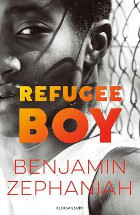Refugee boy by Benjamin Zephaniah

Bloomsbury, 2017. ISBN 9781408894996
(Age: 13+) On the disputed border of the African countries Eritrea
and Ethiopia, armed militants from both sides terrorise villagers
for being from the other nation. Teenager Alem has an Ethiopian
father and an Eritrean mother and his family literally has nowhere
to go because of the hatred and intolerance soldiers from each
nation show for the citizens of the other.
Naively thinking that he is going on holiday, Alem accompanies his
father to England where he enjoys the marvels of London for a couple
of days before he wakens in their hotel room to find his father
gone. In a desperate bid to ensure his son's safety, Alem's father
had abandoned him and returned to his border village, in the hope
that Alem might be granted refugee status.
Whilst Alem experiences an understandable sense of bewilderment and
loneliness, he is remarkably resilient and mature for his years and
stoically endures the trials of his predicament, trusting in his
father and British civil service.
Placed into a refuge for teenagers, Alem finds himself alone amongst
boys who appear to be a mixture of young offenders and orphans,
inevitably becoming a target for moronic bullies who derive pleasure
from domination through violence.
Alem endures this hardship and struggles to understand mindless
behaviour and careless attitudes to education and self-improvement
at the school he attends. Coming from an austere background in a
dysfunctional country, Alem has high expectations of British society
and experiences disappointment when he realises that some citizens
have no awareness of their good fortune.
Eventually Alem's personal circumstances improve when he is placed
with a loving foster family whose only desire is to ensure his
happiness and safety. Sadly, letters from his father confirm a
rapidly deteriorating situation at home and he lives in constant
fear for his parents.
This revealing story explains the difficulties faced by both
refugees and those public servants and legal adjudicators whose task
it is to determine who deserves asylum and who must be repatriated.
As with other stories dealing with similar situations, I could not
help feeling a sense of despair that so much trauma is caused by
religious, political and territorial disputes. So many people are
currently displaced in the world that it seems unlikely they will be
granted asylum anywhere safe. This novel considers the role of
advocates, protesters, lawyers and the judiciary in dealing with a
situation which is often presented too simplistically by both sides
of the debate.
Rob Welsh